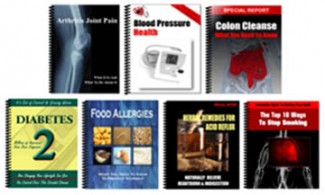 License Type: Master Resell Rights
License Type: Master Resell Rights  File Size: 12,191 KB
File Size: 12,191 KB File Type: ZIP
File Type: ZIP
 SKU: 12627
SKU: 12627  Shipping: Online Download
Shipping: Online Download
Ebook Sample Content Preview:
As we've mentioned, some food allergies are not allergies at all. In reality, they're simply a food intolerance. This extends to wheat allergies as well. The truth is this: only a very small percentage of the population suffers from true wheat allergies. Many others, who believe they're suffering from a wheat allergy, are simply experiencing an intolerance.
A true allergic reaction to wheat and wheat products comes on quite suddenly and can actually be life threatening. In fact, you may very well experience anaphylactic-type symptoms such as hives, swelling, difficulty breathing, coughing, and vomiting. A person experiencing an allergic response to wheat requires immediate medical attention or otherwise risks serious complications and possibly even death.
If you suspect you might be allergic to wheat or wheat products, you shouldn't hesitate to see their doctor as soon as possible. A simple blood test can easily determine if you're truly allergic or not. If it is determined that you're allergic to wheat, you'll want to immediately begin taking steps to prevent your further exposure to wheat, thus minimizing future allergic responses. As with most medical conditions, awareness of your allergy is the most important first step to treating the allergy.
By the way, even very small children can have wheat allergies. As a parent, if you suspect such an allergy, you'll want to take the necessary steps to having your child diagnosed as early as possible. While your child may not fully understand or appreciate the diagnosis, you and your physician can begin to teach your child how to adapt to the changes in life style that will be necessary to minimize future allergic reactions.
The only treatment for a true wheat allergy is to completely eliminate wheat from your diet. This may sound simple and easily undertaken at first, but in reality it's quite a daunting task. Wheat is found in many of the foods that comprise the American diet. The basic foods to avoid are grain products such as bread, cereal, and pasta. However, the allergy sufferer will also have to avoid cakes, cookies, crackers and pies. In addition, wheat may also be an ingredient in many canned foods.
What many of us do not realize is that wheat is also often used as a thickener. Foods such as soups, gravies and sauces use wheat for this purpose, so they'll also need to be avoided. And some drinks such as beer and root beer can contain wheat products. The list of foods that contain wheat can be quite extensive. For this reason, if you've been diagnosed with wheat allergies, you'd be wise to consult a registered dietician for diet alternatives that can help to prevent future allergic reactions while still maintaining a healthy well-rounded diet.
- File Size:12,191 KB
- License: Master Resell Rights
- Category:Ebooks
- Tags:2010 Ebooks Master Resale Rights








